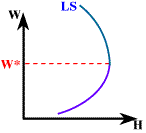

Copyright © 1995-2004 OnLineTexts.com, Inc. - All Rights Reserved

A backward bending labor supply curve has both a positively and negatively sloped portion. At a wage rate below W* the substitution effect dominates so that our consumer chooses to work more as wages rise. Once her wage reaches W* the income effect dominates and she chooses to purchase more leisure and she begins to work less as wages rise.


Copyright © 1995-2004 OnLineTexts.com, Inc. - All Rights Reserved